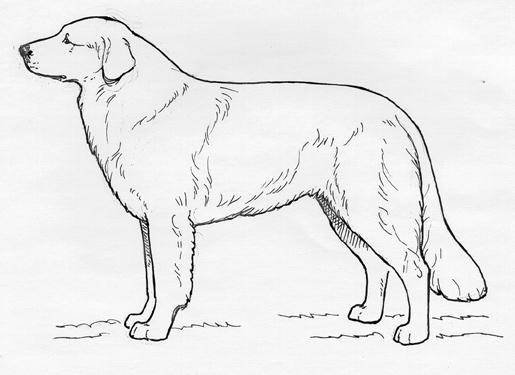Slovac Cuvac
Guardian Dog Group
The goals and purposes of this breed standard include: to furnish guidelines for breeders who wish to maintain the quality of their breed and to improve it; to advance this breed to a state of similarity throughout the world; and to act as a guide for judges.
Breeders and judges have the responsibility to avoid any conditions or exaggerations that are detrimental to the health, welfare, essence and soundness of this breed, and must take the responsibility to see that these are not perpetuated.
Any departure from the following should be considered a fault, and the seriousness with which the fault should be regarded should be in exact proportion to its degree and its effect upon the health and welfare of the dog and on the dog’s ability to perform its traditional work.
History
Originating in the Slovakian Republic, the Slovac Cuvac is one of a group of white shepherd and guardian breeds that are descended from Arctic wolves.
The Slovac Cuvac was recognized by the United Kennel Club July 1, 2006.
General Appearance
The Slovac Cuvac is an impressive dog, well suited to mountain life, with his rather long legs and thick white coat. In order to distinguish him from the predators of the night, by ancient tradition he is bred only in white.
Characteristics
Vigilant, fearless and alert, boundlessly faithful and always ready to fight off any intruder, even if it is bear or wolf.
Head
Wolf like in shape.
SKULL
Broad between the ears, flat on top, with a shallow furrow at the forehead and a moderate stop.
MUZZLE
About the same length as the skull, with a straight nasal bone. Fairly broad under the eyes, tapering in width towards the nose. The lips are close fitting and black.
Disqualification: Incomplete black pigment on lips.
TEETH
The Slovac Cuvac has a complete set of evenly spaced, white teeth meeting in a scissors bite.
NOSE
Black, but may fade slightly in winter. (Snow nose).
Disqualification: Butterfly nose.
EYES
Oval in shape and dark brown in color, the eyes have dark haws and black rims, making them expressive.
Disqualification: Lack of complete black pigment on eye rims. Yellow eyes.
EARS
Set on high, hanging, but mobile at the base. When in repose, the rounded lower edge reaches to the corner of the mouth.
Neck
Powerful, and carried high when the dog is alert. No dewlap.
Forequarters
Shoulder blades and upper arms are long and well laid back.
FORELEGS
The forearm is strong, muscular and long. The legs overall are quite long, more than half the height at the withers, particularly in males. The pastern is short, strong and moderately sloping.
Body
The chest is broad and deep, reaching below the level of the elbows. The ribcage is long, and the ribs are well sprung. The back is straight and of medium length. The loin is moderately arched and long enough for flexibility. The croup is broad and slightly sloping. There is moderate tuck up.
Hindquarters
The angulation of the pelvis and femur is approximately 90 degrees.
HIND LEGS
The lower thigh is sloping and well muscled. There is good angulation at the stifle joint. The hock is well let down and well angulated. The rear pasterns are short and strong. Dewclaws are not desired.
Feet
Firmly arched and round in shape, with fleshy black pads.
Tail
Set on low, reaching to the hock. In repose the tail hangs straight. When moving, the tail is carried curled over the loin.
Coat
Dense, double, and moderately wavy. The hair is short on the face and front of legs, longer on the body, but without feathering on the tail or buttocks. There is a distinct mane on the males. The coat must never part down the middle of the back. The undercoat, which is fine and dense in the winter, must be completely covered by longer topcoat.
Color
White. Yellowish shadings around the ears are permitted. Distinct yellow patches are not permitted.
Disqualification: Yellow patches in coat.
Height and Weight
Height for males is 24.5 to 27.5 inches. For females, it is 23 to 25.5 inches. Weight ranges from 79 to 97 pounds for males; from 68-81 pounds for females.
Gait
Light footed, quick and agile in any sort of terrain.
Disqualifications
(A dog with a Disqualification must not be considered for placement in a conformation event, and must be reported to UKC.)
Unilateral or bilateral cryptorchid.
Viciousness or extreme shyness.
Albinism.
Yellow patches in coat.
Yellow eyes.
Butterfly nose.
Incomplete black pigment on lips.
Lack of complete black pigment on eye rims.

Looking for a Dog?
Find a dog that will fit your family.
Note: The breeders on this list are not endorsed by UKC.
©Copyright 2006, United Kennel Club
